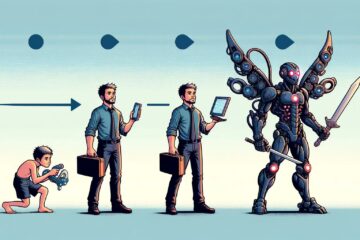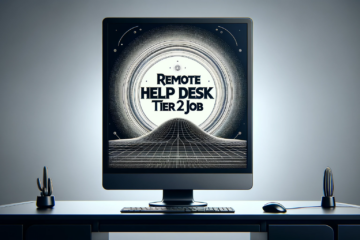Being an IT technician usually implies that you’re someone people reach out to to solve their IT problems. In other words, in order to be good at IT support, you need to know the solution for a lot of technical issues or know where to look for the answers, right?
Well, it’s more than just that!

What if people on the other end of the line are argumentative, panicking, or don’t know how to explain the problem in words? What do you do then?
In order to grow as an IT expert, you’ll have to master a set of people skills or soft skills.
What are these crucial IT soft skills?
Let’s find out together!
Communication in IT

As an IT support specialist, you’ll often have to address clients’ concerns who may not understand the technical aspect of your work. Your ability to simplify complex issues and reassure them might become a powerful tool. This is one of the soft skills for IT, which has the potential to turn a potentially frustrating experience into a positive one.
Even though IT support often involves individual tasks, you’ll always have to communicate with your coworkers. Some problems are too difficult for you to resolve alone, so you need help. It doesn’t matter if it’s troubleshooting, sharing knowledge, or escalating an issue; good communication ensures smooth teamwork. Miscommunication has the potential to lead to longer problem-resolution times, which means that staying on the same page with your colleagues might be an important skill.
Experts running a premium MSP staffing company will attest that many people wrongly dismiss the importance of communication or even assume that this skill will diminish in value in the near future, mostly because generative AI is becoming so advanced.
Sure, you no longer have to be a literary genius to craft a well-put sentence, but you still need to know how to express your thoughts in order to write a decent prompt. This is something that will ensure that communication remains one of the IT soft skills that won’t soon become surpassed in significance!
Empathy and its Role in IT Support Success

People are afraid of something they don’t understand. When their device, app, or system malfunctions, they might not be able to accurately assess the severity of the issue. Just think of the last time you had a malfunction with something out of your sphere of knowledge and had to deal with something you didn’t quite understand.
No one likes to be looked down upon, and no one wants to hear a condescending voice on the other end of the line. Even if you’re not talking to them via VoIP or video call, the person on the other end might still notice the condescending tone in your response.
You need to understand that they’re frustrated with things not working the way they believe they should. This is why empathy is one of the most important soft skills in IT.
According to most experienced and successful providers of MSP staffing services, there’s a common myth about people just being bored and bothering customer support for no reason. There’s also a stereotype of a client just calling customer support as soon as the first thing malfunctions. None of this is true in the vast majority of cases.
In a way, people in IT are like firefighters. No one wants them to have to visit their home, but if there’s a fire, everyone will be glad that they’re there!
Understanding this will help you understand the state of mind of people reaching out for support.
Active listening as a Crucial Skill in Successful IT Support

The concept of active listening is about more than just hearing words. It’s about picking up details your clients don’t even realize are important themselves. If you pay close attention and then ask the right questions, you can catch subtle clues about the issue, and this will lead you to quicker solutions and show clients that you are actually engaged in their problems.
When a user explains a problem, ask them to clarify all the details in order to ensure that the scope of the issue is fully understood. Delivering such information is not an easy task for a layman, which is why active listening is such an important soft skill in tech. It’s also why it’s considered a skill and a difficult one to master at that. You need to know which questions to ask.
It’s like at the doctor’s office.
You’ll start by asking them about symptoms and then start being more and more specific. Remember that they may not have the words to explain what’s going on… but you do. This is like when a doctor asks you how it hurts and notices that you’re stuck looking for the right word. Then, they offer you a few options to choose from. Is it sharp or radiating?
You want to avoid jumping to conclusions. Making a wrong assumption or even asking leading questions can lead you completely off track. As a result, you’ll be wrong, which will lead to a diminished quality of service. This is always important, but it’s especially crucial when doing business online.
Patience as the Cornerstone of Quality IT Support Services

You should never underestimate the importance of patience in IT support.
This is one of the most important IT soft skills because all the other skills heavily depend on it. This is true even for the skills we’ve just described. After all, you need patience in order to be a good communicator. Without patience, your fuse will quickly burn out and you won’t be able to show the needed level of empathy. Most importantly, you can’t be a good active listener without patience because crucial information takes a while to unveil itself.
It’s very common to receive the same question over and over again, especially from non-technical users. If you haven’t explained it very well, they might rephrase it, believing that you didn’t understand what they asked for.
Other questions will be outright bizarre.
This can be incredibly frustrating, but instead of getting frustrated, you need to see each interaction as an opportunity to educate users and ensure they understand, helping them become more self-sufficient in the future. In other words, you can be patient and explain it again, or have to deal with the same issue in a week or two because you couldn’t be bothered today.
Not every support user will be easy to work with. Some of them might be upset or frustrated by the time they reach you. Patience (combined with empathy) will help you power through this and provide them with the support they want.
The importance of soft skills for IT professionals lies in the fact that not all problems can be just fixed in a straightforward manner. For excellent IT support, you need a bit of finesse.
Developing people skills is mandatory for anyone looking for a career in IT support
Being an IT specialist means you’re a bridge between the technical aspect of the job and public relations. In other words, you’re a translator, and in order to be a good translator, you need to speak at least two languages fluently. It means that you have to simultaneously develop your technical prowess, follow the latest trends, and employ soft skills at the same time. Without doing it all simultaneously, you won’t be able to move forward and provide excellent IT support!



0 Comments